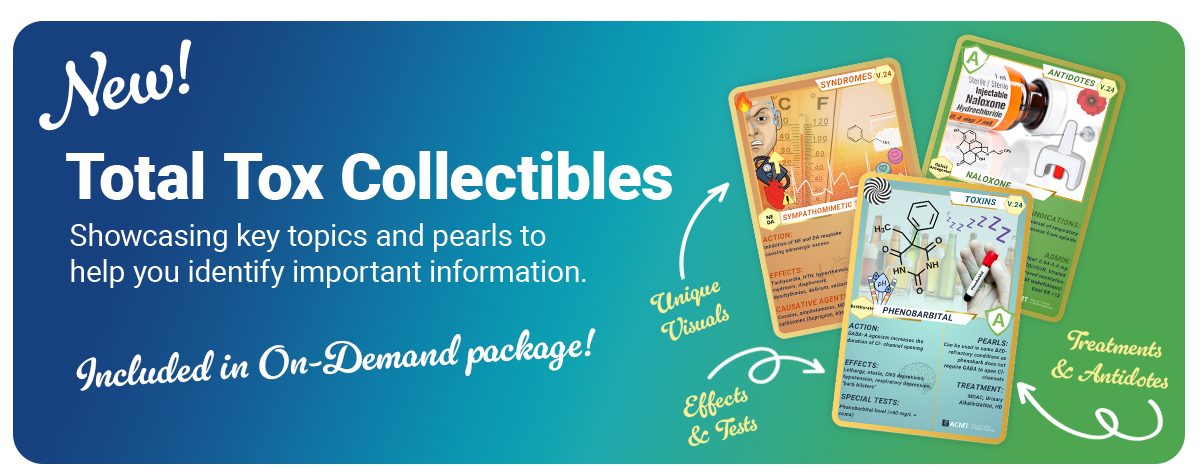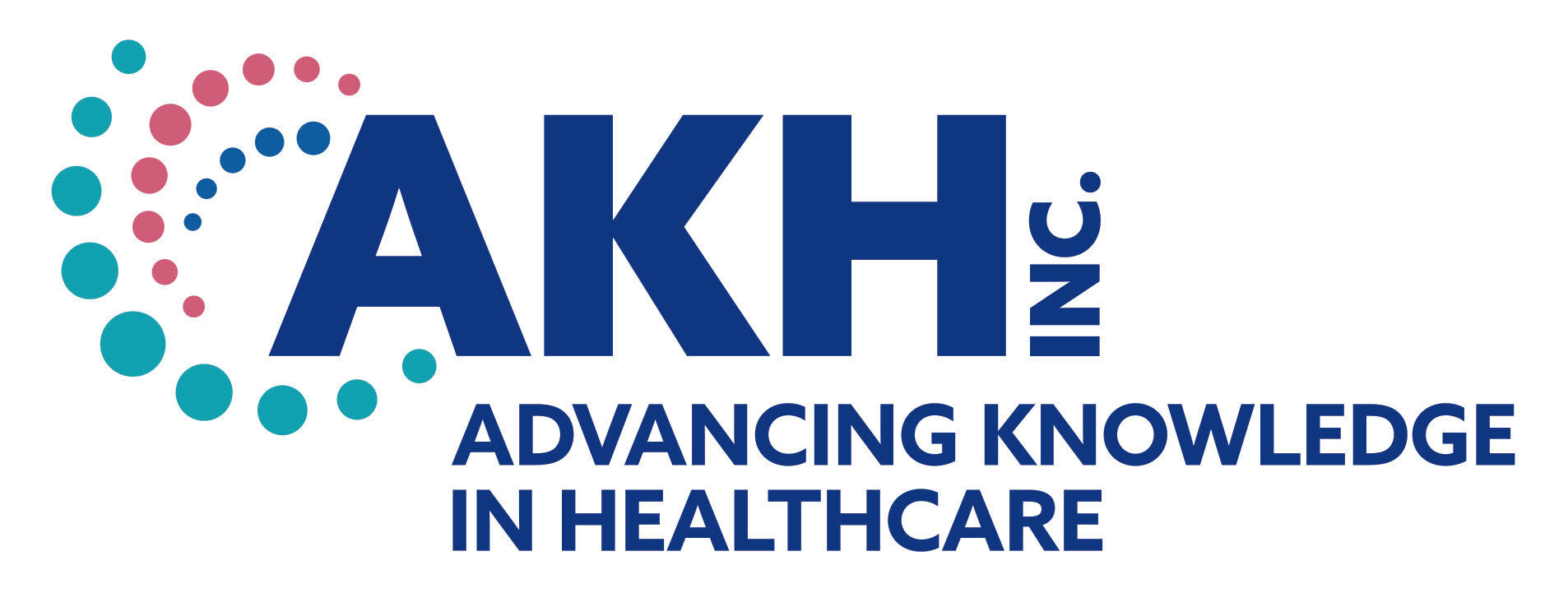
#TotalTox
Unlock the ultimate on-demand toxicology learning experience with ACMT's Total Tox Course!
Tailored for healthcare professionals, this self-paced course offers an in-depth exploration of medical toxicology, covering pharmaceuticals, substance use, emergency preparedness, and non-pharmaceutical medical toxicology. Enjoy the freedom to learn at your own pace, with access to lectures and slides for 90 days.
As a special addition to your registration, receive the Total Tox Collectibles—a set of visual stimulus cards covering essential lecture topics. These cards use imagery to illustrate potential actions and effects in patient cases, designed to support your clinical insights and provide a memorable, visual learning tool.

Each activity includes a pre-test to assess your current knowledge and concludes with a post-test to measure your progress, helping you earn a CE certificate for each activity. As you complete each lecture, you’ll also receive a Total Tox Collectible Card, a keepsake to reinforce key points and takeaways from the course.
Ready to elevate your medical toxicology expertise? Register now and start expanding your knowledge!
Recommended By:
Target Audience
This course is designed for a diverse audience including physicians, pharmacists, advanced practice nurses, nurses, physician assistants, medics, EMTs, SPIs, laboratorians, poison center educators, first responders, and residents and students eager to expand their expertise.
Group Discounts Available
Is your hospital or medical group interested in enrolling multiple employees in our course? We offer special discounts for organizations with multiple participants. Contact us at events@acmt.net for more details!
Register for the Complete Course - Save $100!
Are you a member of any of these organizations (but not a member of ACMT) AAEM, AAENP, AHEPP, APC, APAMT, DrugImpairment.com, EAPCCT, or MENATOX? You are eligible for a registration discount! Please email us at events@acmt.net for more information.
-
Contains 3 Product(s)CE Credit available
All sections of the Total Tox Course - Save $100 when you register for the Full Course Package!
-
Register
- Non-member - Tier I - $575
- Non-member - Tier II - $575
- Non-member - Tier III - $350
- Non-member - Tier IV - $200
- Member - Tier I - $500
- Member - Tier II - $500
- Member - Tier III - $275
- Member - Tier IV - $125
- More Information
-
Register
Register for Individual Activities
Each activity can be purchased individually and is accredited and with its own Continuing Education certificate.
EM Model Topics
Our expert-led activities will cover a comprehensive range of topics, including EM Model Topics like:
Activity 1 - Pharmaceuticals
- 1.3.38 (Poisoning)
- 1.3.57 (Toxidromes)
- 4.7.3 (Stevens-Johnson syndrome)
- 4.7.4 (Toxic epidermal necrolysis)
- 17.1.2.1 (Acetaminophen)
- 17.1.2.2 (Nonsteroidal anti-inflammatories)
- 17.1.2.4 (Salicylates)
- 17.1.3 (Anticholinergics)
- 17.1.4 (Anticoagulants/Antithrombotics)
- 17.1.5 (Anticonvulsants)
- 17.1.6 (Antidepressants)
- 17.1.6.2 (Selective serotonin reuptake inhibitors)
- 17.1.7 (Antiemetics)
- 17.1.8 (Antimicrobials)
- 17.1.9 (Antipsychotics)
- 17.1.18 (Lithium)
- 17.1.11.3 (Beta blockers)
- 17.1.11.4 (Calcium channel blockers)
- 17.1.11.1 (Antiarrhythmics)
- 17.1.11.2 (Antihypertensives)
- 17.1.17 (Hypoglycemics/Insulin)
- 19.4.11.1 (Decontamination)
Activity 2 - SUD & Emergency
- 6.7 (Radiation Emergencies)
- 10.2 (Biological Warfare Agents)
- 14.1 (Substance Use Disorders)
- 14.1.2 (Illicit drug use)
- 14.1.3 (Prescription drug use)
- 14.1.5 (Withdrawal syndromes)
- 14.5.1.2 (Drug psychoses)
- 16.4.6 (Environmental/Industrial exposure)
- 16.5.2 (Toxic effects of gases, fumes, vapors)
- 17.1.2.3 (Opioids)
- 17.1.10 (Carbon monoxide)
- 17.1.12 (Cholinergics)
- 17.1.13 (Cyanides, hydrogen sulfide)
- 17.1.15 (Herbicides, insecticides and rodenticides)
- 17.1.16.3 (Inhaled irritants)
- 17.1.24 (Recreational drugs)
- 17.1.25 (Sedatives/Hypnotics)
- 17.1.26 (Stimulants/Sympathomimetics)
- 18.1.10.2 (Corneal Burns)
- 18.1.3.3.2 (Chemical Burns)
- 19.4.11.1 (Decontamination)
Activity 3 - Non-Pharm
- 2.2.2.3/17.1.16.1 (Caustic agents)
- 6.1.1 (Arthropods)
- 6.1.3 (Marine organisms)
- 6.1.4 (Reptiles)
- 8.5.3/17.1.21 (Methemglobinemia)
- 14.1.1 (Alcohol use disorder)
- 14.1.5 (Withdrawal syndromes)
- 17.1.1.1 (Ethanol)
- 17.1.1.2 (Ethylene glycol)
- 17.1.1.3 (Isopropyl)
- 17.1.1.4 (Methanol)
- 17.1.3 (Anticholinergics)
- 17.1.7 (Antiemetics)
- 17.1.14 (Heavy metals)
- 17.1.15 (Herbicides, insecticides, and rodenticides)
- 17.1.16 (Household/Industrial chemicals)
- 17.1.16.2 (Hydrocarbons)
- 17.1.19 (Local anesthetics)
- 17.1.22 (Mushrooms/Poisonous plants)
- 17.1.20 (Marine toxins)
- 17.1.23 (Nutritional Supplements)
- 18.1.3.2 (Bite wounds)
| Access Date | Quiz Result | Score | Actions |
|---|
Please Login
Continuing Education
Continuing Education credit for this activity is provided by AKH Inc., Advancing Knowledge in Healthcare. The activity is pending approval, and registrants will be able to claim up 8.0 Continuing education credit per activity.
Continuing Education available for
Pharmacists, Physicians, Physician Associates, Nurses, and Nurse Practitioners.



